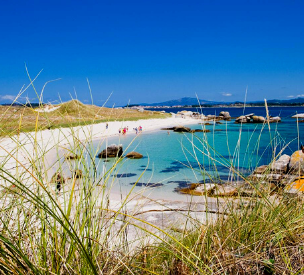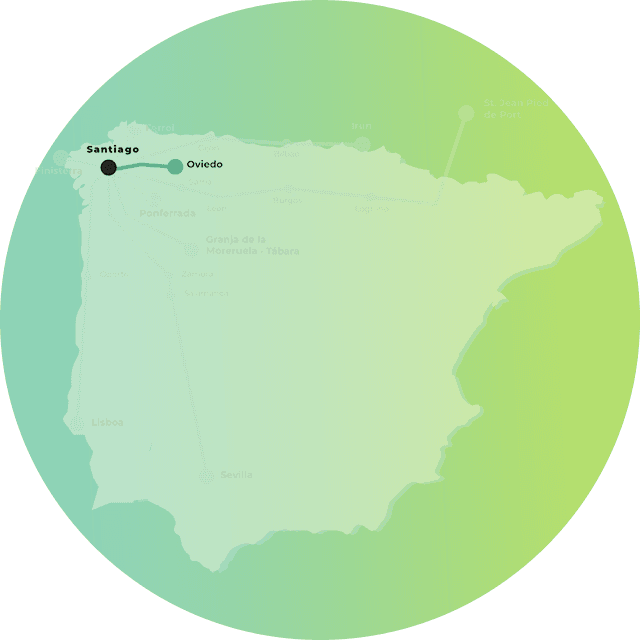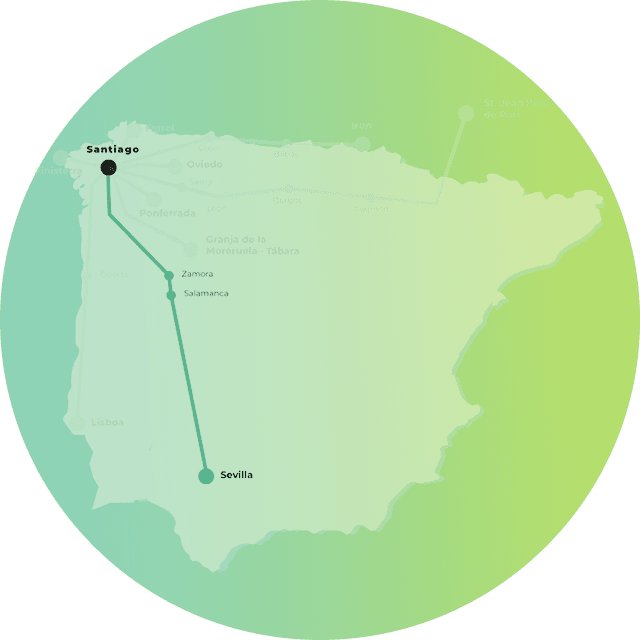The Route of Father Sarmiento
A journey that will take you to “the most picturesque region you can imagine.”
It is one of the most emblematic and significant routes of the Camino de Santiago, with a rich historical tradition that connects towns of great cultural value. With this phrase, the writer Emilia Pardo Bazán described some of the places you will discover along the Route of Father Sarmiento, a 190-kilometer journey that starts in the beautiful city of Pontevedra and follows the coast, finally joining the Ulla River in Pontecesures, before continuing along the Portuguese Way to Santiago de Compostela.
The Route of Father Sarmiento is a journey that honors the memory of this illustrious priest and pilgrim, who dedicated his life to the promotion of culture and knowledge, as well as the deepening of his faith. Like Father Sarmiento, the pilgrims who travel this route experience a unique spiritual journey, marked by reflection and a connection with the cultural and religious legacy of the Camino.
Services we offer on the Padre Sarmiento Route
Included in all our routes
- Accommodation booking selecting the best lodgings according to your budget.
- Luggage transport between stages.
- Practical information about the Camino in a detailed guide.
- Phone assistance en route we’re by your side for any questions or incidents.
- Travel insurance with broad coverage.
On group tours
- Accompanying guides professional support throughout the Camino.
- Support vehicle available during the stages.
Optional services
- Meals and diets: option to add breakfasts or half board.
- Private transfers to/from the point you need.
- Bicycle rental (mountain or electric bikes).
Map Route of Father Sarmiento
The map shows the complete route of the Father Sarmiento Trail, which begins in the beautiful city of Pontevedra and stretches for 190 kilometers until reaching Santiago de Compostela. This itinerary, rich in history and beauty, passes through coastal landscapes and culturally significant areas, including towns such as Sanxenxo, O Grove, Cambados, and Padrón.
At the bottom, the elevation profile of the route is displayed, highlighting altitude variations and the landscapes encountered along the way. Each stage of the journey offers a unique experience, with views of the stunning estuaries of Pontevedra and Arousa, vineyard landscapes, and a rich cultural heritage that invites reflection. It is both a spiritual and physical journey, allowing pilgrims to deeply connect with the history and legacy of the region.

Information about the Route of Father Sarmiento
Why Choose the Route of Father Sarmiento?
The Route of Father Sarmiento and the Sea as a Constant Companion.
The Route of Father Sarmiento highlights the Salnés region, one of Galicia’s most important tourist destinations. In addition to its spectacular coastal landscapes, the trail of Father Martín Sarmiento offers travelers a journey through history, tradition, culture, gastronomy, and viticulture.
This is undoubtedly a perfect trip for sea lovers, who can admire stunning beaches such as A Lanzada, Sanxenxo, and O Grove, many of them awarded the Blue Flag. Visitors can also savor a glass of the region’s renowned wines and enjoy freshly caught seafood served in local restaurants.
What to See and Do on the Route of Father Sarmiento?
Landscapes, charming villages, spectacular monasteries, and exquisite wine gastronomy.
Where does the Padre Sarmiento Route begin?
From Pontevedra
The Route of Father Sarmiento can begin either from the city of Pontevedra or directly from Poio. Poio is located just across from Pontevedra and is separated by the Ría. From Pontevedra, the Route of Father Sarmiento stretches a total of 190 kilometers, which can be divided into 9 stages.
Stages of the Way of Father Sarmiento
The Route of Father Sarmiento is an itinerary filled with history, spirituality, and natural beauty, offering a unique experience along its 190 kilometers. From the city of Pontevedra to its connection with the Portuguese Way in Pontecesures, the route passes through coastal landscapes, towns with great cultural value, and monuments of profound significance. Each stage of the route invites pilgrims to immerse themselves in the tradition and serenity of the Camino, from views of the sea to the peaceful rural landscapes of Galicia. Through the following links, you can discover the main stages, their distances, points of interest, and useful tips to make the most of this wonderful journey. Keep in mind that upon reaching Padrón, the route merges with the Portuguese Way.
The Villages of the Route of Father Sarmiento
History of the Route of Fray Sarmiento
Who was Father Sarmiento?
Known as Fray Martín Sarmiento, Father Sarmiento was born Pedro José García Balboa in Villafranca del Bierzo in 1695. He spent his childhood in Pontevedra, where his father had moved to work. At a very young age, he entered the Benedictine order and studied Arts at the monastery of Lérez. At 15, he moved to Madrid to take the Benedictine habit. He also studied Philosophy at the monastery of Irache and Theology in Salamanca.
He was a staunch defender of science and conducted extensive research on Galicia. After traveling through Asturias and Galicia, he meticulously documented his routes, which later became a source of news, curiosities, and future initiatives. His work paved the way for the study and teaching of Galician culture, making him, alongside Feijoo and Jovellanos, one of the great figures in the field of education.
In his relationship with Galicia, he always harbored a deep love for his homeland and its language. Considered one of the most prominent intellectuals in Galician thought, he was the first scholar to take a serious interest in the Galician language and promote its use, both academically and colloquially. He advocated for the publication of texts and the establishment of chairs for its instruction.
In 1745, he embarked on a journey on foot to Santiago de Compostela, documenting his experiences in a valuable diary titled “Viaje A Galicia.”
Origin of the Route of Father Sarmiento
“On July 19, 1745, I departed from Pontevedra for Santiago, tracing the entirety of O Salnés. I embarked on my journey, capturing the beauty of my homeland in these pages. I sought to preserve the essence of the stunning landscapes I traversed, ensuring they remained etched in my memory forever upon my return to Madrid.” These were Father Sarmiento’s words as he embarked on his pilgrimage along the coast of Pontevedra to Santiago de Compostela, with the goal of earning the Jubilee.
More than two hundred and seventy years later, the route that Fray Martín Sarmiento embarked on that July morning has been revived, thanks to the efforts of the Mancomunidad de O Salnés, with the aim of offering an alternative to the Camino de Santiago.
Frequently asked questions about the Route of Padre Sarmiento
The Route of Padre Sarmiento is very accessible, ideal for both beginner pilgrims and those looking for a quiet route. The main difficulties of this route are related more to the duration than to the terrain, since most of the route is relatively flat, with some small undulations as it enters rural and coastal areas.
The Ruta del Padre Sarmiento is a particular route which, at about 190 km, is generally a total of 9 stages. Therefore, divided like this, it takes 9 days to complete the Ruta del Padre Sarmiento on foot.
Each stage would be the distance you walk in one day, from the starting point to the end of the walk, where you will spend the night. The stages can vary in distance and difficulty, and it is important to note that they can be adjusted according to your pace and physical condition. Some pilgrims choose to divide certain long or hard stages, or lengthen those that are shorter or easier to walk. It all depends on having a place to sleep.
The Route of Padre Sarmiento starts in Pontevedra and ends in Santiago de Compostela, covering 190 km in 9 stages.
The Route of Father Sarmiento is a journey of 190 km that runs along the spectacular Galician coast from Pontevedra to Santiago de Compostela. Along the way, pilgrims enjoy breathtaking coastal scenery, bordering the estuaries of Pontevedra and Arousa, with beaches, cliffs and vineyards that stand out for their natural beauty.
The terrain is mainly flat, although it is gently undulating as it enters rural areas and small Galician villages. The route crosses the Parque Natural de las Dunas de Corrubedo, a unique environment that combines sea and nature in its purest form. Ideal for those looking for a quiet route full of contrasts, with few slopes but abundant scenic beauty.
Along its approximately 190 kilometres, the Ruta del Padre Sarmiento is divided into the following 9 stages:
- Pontevedra – Sanxenxo (25 km)
- Sanxenxo – O Grove (19,5 km)
- Circular O Grove (28 km)
- O Grove – Cambados (22 km)
- Cambados – Illa de Arousa (18 km)
- Illa de Arousa – Vilanova de Arousa (16,8 km)
- Vilanova de Arousa – Vilagarcía de Arousa (11,9 km)
- Vilagarcía de Arousa – Padrón (25,6 km)
- Padrón – Santiago de Compostela (24,3 km)
This division can be modified, depending on the preferences and possibilities of each person, always bearing in mind to have a place to spend the night.
Posts related to the Route of Father Sarmiento
Other routes of the Camino de Santiago
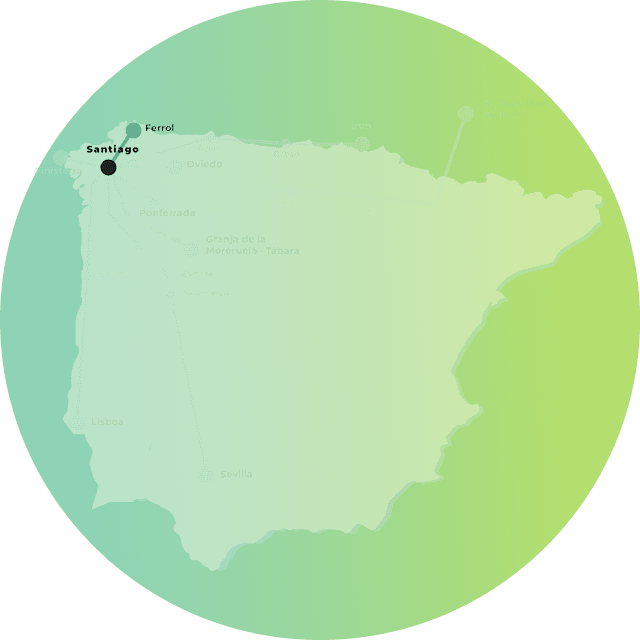
English Way
From Ferrol to Santiago de Compostela. Delve into the culture of villages of great military, naval and historical importance. 5 Etapas | 125 km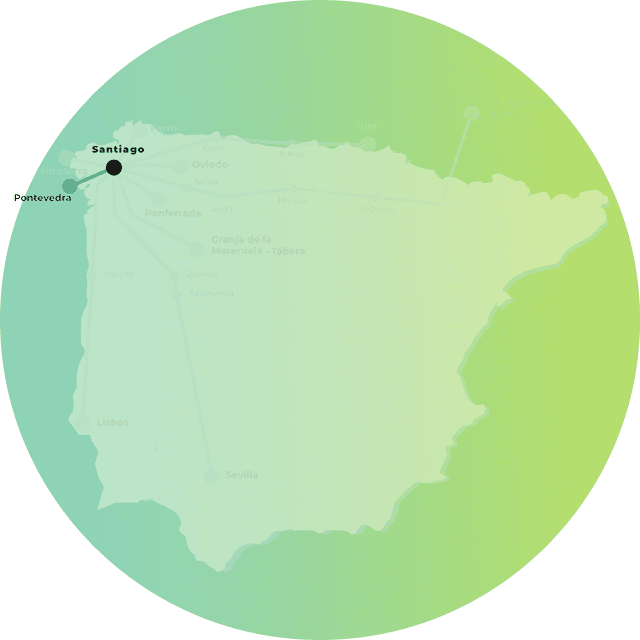
Father Sarmiento Way
The Father Sarmiento Way links Pontevedra to Santiago de Compostela, offering a scenic journey through beautiful landscapes. 6 stages | 142 km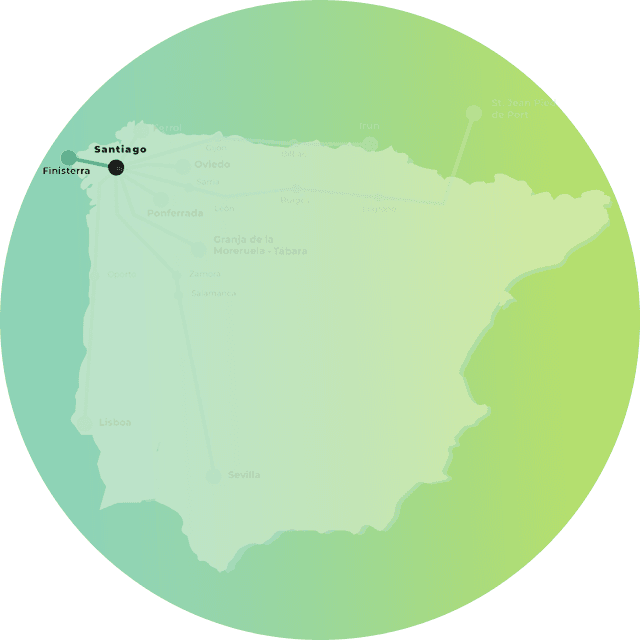
Finisterre and Muxía Way
From Santiago de Compostela to Muxía. A mystical and spiritual journey to the ends of the Earth 5 stages | 120 km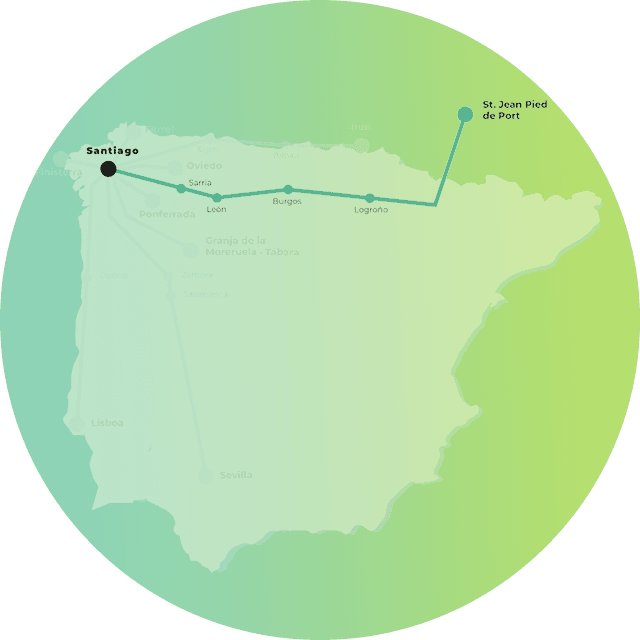
French Way
From Saint-Jean-Pied-de-Port to Santiago, trace Charlemagne’s path through the Pyrenees and trek 800 km on the French Way. 33 stages | 768 km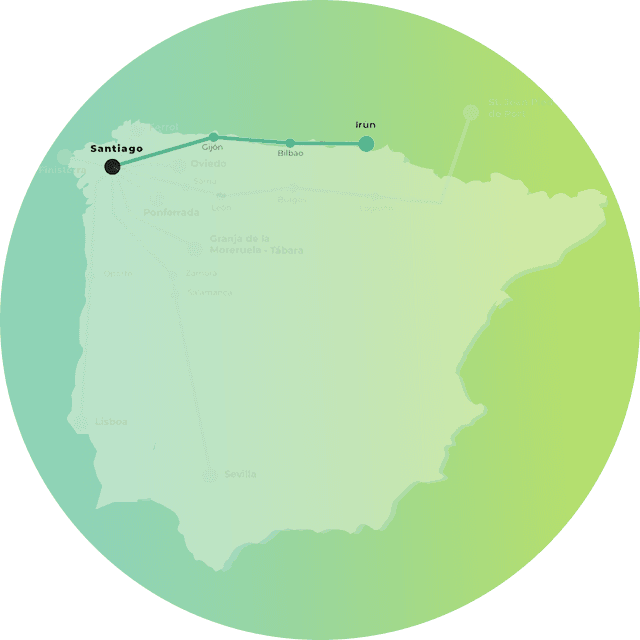
Northern Way
From Santiago de Compostela to Muxía. An unforgettable experience with breathtaking scenery 34 Stages | 820 km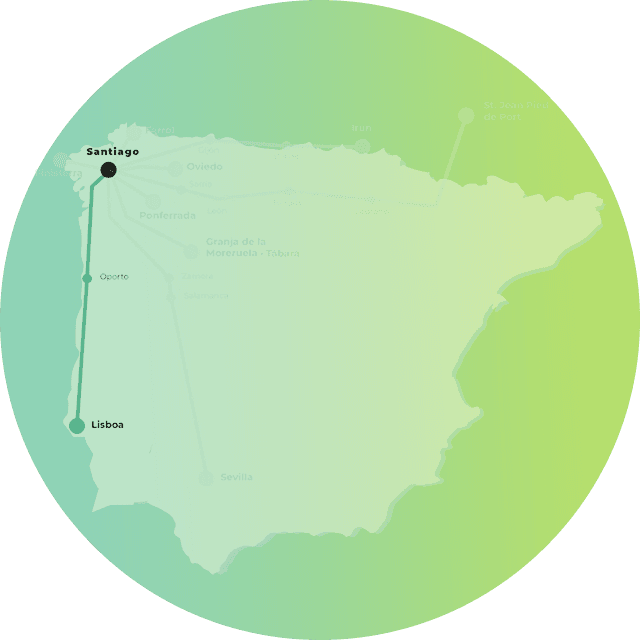
Portuguese Way
Starts in Lisbon and leads to Santiago de Compostela, offering a scenic journey through charming towns, coastal views, and culture. 27 stages | 620 km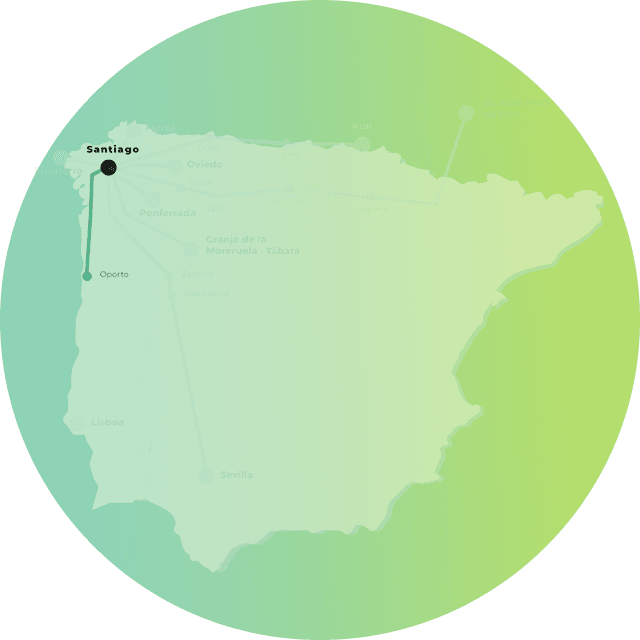
Portuguese Way along the coast
From Oporto to Santiago de Compostela. Total 194 km - 8 stages 8 Stages | 194 km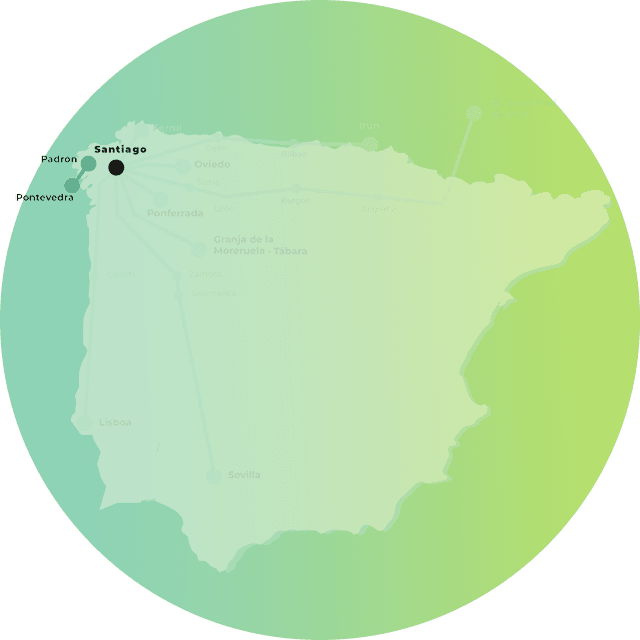
Portuguese Way: spiritual variant
From Pontevedra to Padrón. Total 81 km - 3 stages 3 stages | 81 km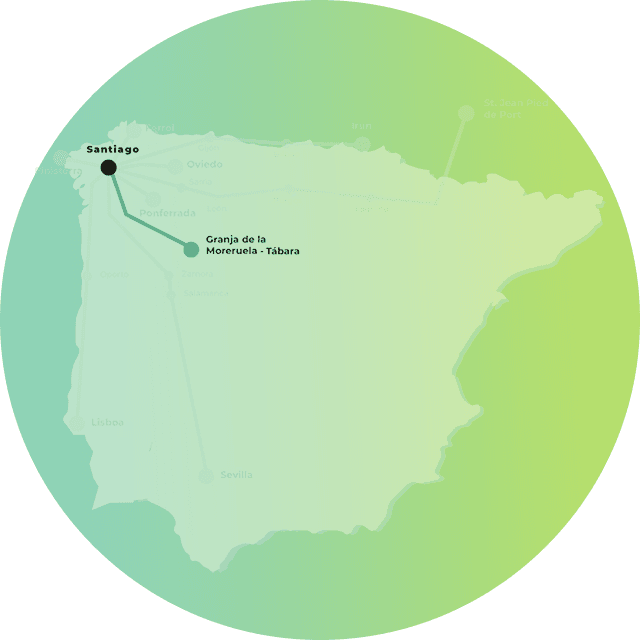
Sanabrian Way
From Granja de Moreruela to Santiago de Compostela. Total 365 km - 13 stages 13 stages | 365 km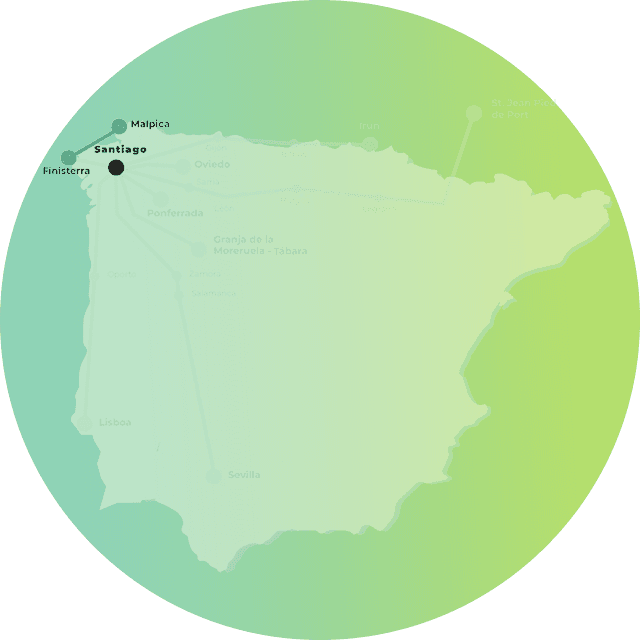
Way of the Lighthouses
From Malpica to Finisterre. A 200-kilometer journey along the coast and through the wildest of nature 8 stages | 195 km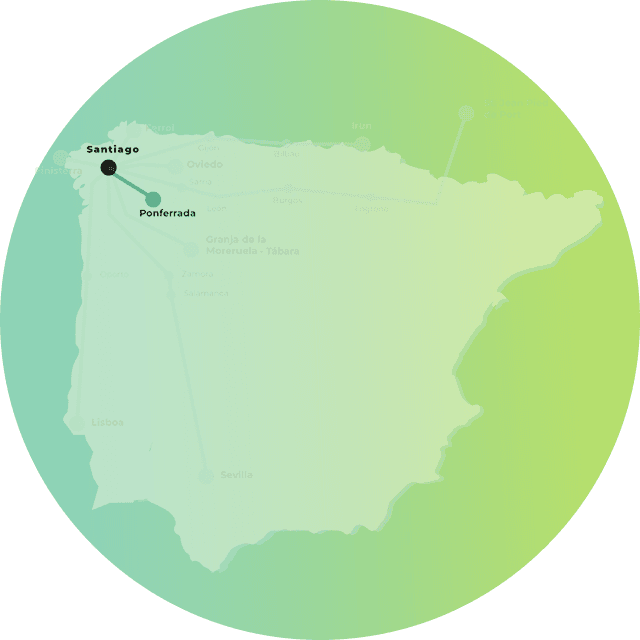
 Skip to content
Skip to content


